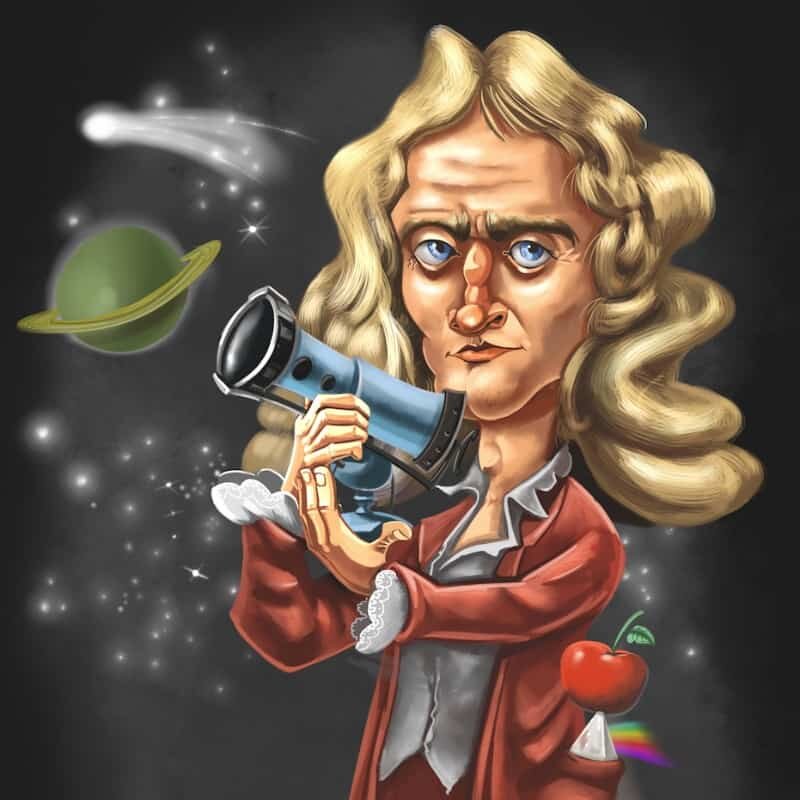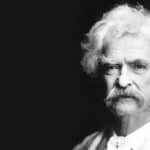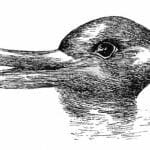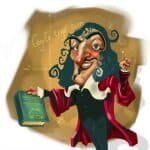ISAAC NEWTON (January 4th, 1643 – March 31st, 1727)
English scientist, natural philosopher, theologian, and mathematician.
Main accomplishments:
- Wrote five different scientific textbooks including his famous Philosophiæ Naturalis Principia Mathematica (1687) and Optiks(1704). Also wrote several scientific essays and religious dissertations.
- Developed both the Three Laws of Motion and the Universal Theory of Gravitation, the latter of which was said to have been inspired by watching an apple fall from a tree. Shaped the way scientists would examine physics and its laws.
- Knighted by Queen Anne and appointed Warden of the Royal Mint and President of the Royal Society.
One of the most important and influential scientific minds of all time, Isaac Newton stands among the ranks of Galileo and Copernicus as men who changed the face of scientific discovery forever. The creator of the “three laws of motion” was not only a scientist, but a natural philosopher, mathematician, and theologian whose writings would significantly influence the coming Enlightenment.
EARLY LIFE AND EDUCATION
Perhaps as an indication of his being ahead of his time, Isaac Newton was born prematurely on January 4th, 1643, as an infant so tiny he was said to have been able to fit into a quart pot. His father, also named Isaac, died three months prior to his son’s birth. When he was only three years old, Hanna Newton remarried to the rector Barnabas Smith and left her young son in the care of his grandmother in order to go live with her new husband. Growing up, Newton loathed his stepfather and resented his mother for abandoning him; later in life, he would admit to threatening to burn their house down with them in it. Not incidentally, Newton was an unhappy child who suffered frequent bouts of anger and depression throughout his youth.
When Smith died in 1654, Hanna pulled Isaac from school in an attempt to make him the inheritor of his biological father’s estate. Thankfully, her brother William recognized Isaac’s academic potential and convinced Hanna to allow Isaac to return to school with hopes of attending university. Newton’s studies paid off when he was accepted to Trinity College Cambridge in 1660 as a sizar—a sort of 17th-century precursor to modern-day work-study programs. It was here that Newton studied Euclid, Aristotle, Descartes, and Hobbes; Newton’s desire for knowledge continued to grow throughout his education.
ACADEMIC CAREER
Newton earned his bachelor’s degree in 1665, but the outbreak of the plague forced Cambridge to close for the next two years before he could further his education. Newton returned home to Woolsthorpe, where he used his newfound free time to put the things he’d learned at Cambridge to work. Newton later remarked that, during these two years, he was “in my prime of age for invention, and minded mathematics and philosophy more than at any time since.” Indeed, it was during the “plague years” that Newton developed his theories of optics, planetary motion, and “fluxions”- what we know today as calculus.
When Cambridge reopened in 1667, Newton returned to the college as a fellow and later professor of mathematics. In 1668, his name was brought to the attention of the scientific community when he invented the reflecting telescope and donated it to the Royal Society in 1672. This was also the year that Newton published his first scientific paper, Philosophical Transactions of the Royal Society.
Newton began to use his newfound position as a fellow in the Royal Society to conduct experiments in light, optics, and color, but found himself clashing with the Society’s curator of experiments, Robert Hooke, whom Newton was falsely accused of plagiarizing. Although the debate was settled peacefully, the stress of the period caused Newton to withdraw from the Society. His reclusiveness was hastened in 1678 when his mother died, triggering a nervous breakdown in Newton. He withdrew from the world and began to study alchemy.
SCIENTIFIC STUDIES
Newton was responsible for launching many scientific theories that we hold as common knowledge today. It was Newton who first proposed that Earth’s gravity influenced the positioning of the moon, and who first devised the three laws of motion. Supposedly in 1666, Newton witnessed an apple falling from a tree- an incident that would kick-start his interest in gravity that would eventually culminate in his theory of universal gravitation in the early 1680s.
In 1687, Newton produced his first and probably most important major scientific work: Philosophiæ Naturalis Principia Mathematica. In this three-volume set, Newton examined the laws of mathematics and devised what would eventually become known as calculus. The importance of the Principia cannot be overstated. Newton’s application of the scientific method to mathematics was revolutionary, and the book itself radically altered the way scientists performed experiments. The Principia has been cited as a significant influence on the theories of John Locke and Adam Smith, who in turn would have a heavy hand in influencing the formation of the United States government!
Even though Newton was viewed as an opponent of the Catholic Church, he was very religious, albeit as an unorthodox Christian. He believed fervently that the intricacies of the natural world were evidence of the hand of an intelligent being at work, and once remarked that “the Supreme God exists necessarily, and by the same necessity he exists always and everywhere.” He was also, however, something of an occult hobbyist: he frequently experimented with alchemy and believed very strongly in the coming Biblical apocalypse.
Despite the fact that Newton was viewed as an opponent of the Catholic Church, he was actually very religious, albeit as an unorthodox Christian. He believed fervently that the intricacies of the natural world were evidence of the hand of an intelligent being at work, and once remarked that “the Supreme God exists necessarily, and by the same necessity he exists always and everywhere.” He was, however, also something of an occult hobbyist: he frequently experimented with alchemy and believed very strongly in the coming Biblical apocalypse.
LATER LIFE
After a second breakdown in 1693, Newton left Cambridge for London, taking a position as Warden (and later Master) of the Mint. In 1703, he was elected President of the Royal Society, and the following year he published his book Optiks. In 1705, he was the first scientist to be knighted.
The later years of Newton’s life were as unhappy as the earlier ones. His reign as President of the Royal Society was described as “tyrannical”, and he dominated the scientific work of his subordinates. The last years of his life were consumed with arguments against Gottfried Wilhelm von Leibniz, over which of them was the real inventor of calculus. A lifelong bachelor, Newton died in his sleep in 1727 and was buried in Westminster Abbey.







